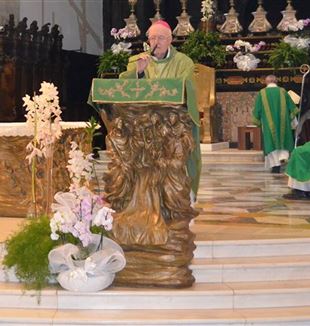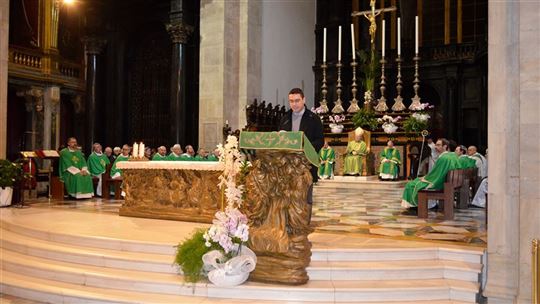
Nosiglia: "Fr. Giussani’s outgoing church”
The homily of the Archbishop of Turin during Mass for the anniversary of the death of Fr. Giussani, on 19 February. "He has been a tool for the power of Christ to work in history”.I am happy to celebrate this Eucharist in memory of Fr. Giussani and I address my warmest greetings and best wishes to all of you in this joyful occasion, rich in gratitude to the Lord who has raised up in his Church the figure and work of Fr. Giussani, our teacher and witness of faith and love for the Church. I would like to recall the theme of fraternity and mission, as the fundamental basis of Fr. Giussani's message, which he also gave us in his teaching. The word of God that we have heard offers us a valid starting point. The Gospel and the Apostle James invite us to be consistent in putting the word into practice and not just be mere spectators. Only thus can we be recognized as disciples of Christ and missionaries of His Gospel. The psalm then accentuates the theme of fraternity, which unites us through love for one another and for all, which distinguishes our faith, lived and witnessed in the Church.
Pope Francis’ affirmation, according to which every Christian is a "missionary disciple", strongly emphasizes the close connection between ongoing Christian formation and every believer’s mission in the world, especially if they are a lay person and are thus immersed, every day, in their own environment of life, work, culture, politics and leisure. I believe that this consideration is today the most fruitful and, at the same time, the most necessary to be implemented consistently: it is the challenge of fraternal synodality and mission, which Fr. Giussani summarized in the binomial "communion and liberation"; it is a commitment that concerns, first and foremost, each individual believer, in addition to the ecclesial community of which he is part.
That is why I like to recall a story that Fr. Giussani told about a theme that is very topical today: the personal commitment to renew the face of the Church and, through it, humanity. Giussani writes: "Let us imagine a woman who is married and has a small child. Let us suppose that she is already a little disappointed, as can happen, with her companion for life, who comes home at night and immediately starts to read the newspaper, or watch television, or perhaps even go out to the bar, without as much as a glance in the direction of his wife or child. One day the child falls ill. The house is some distance from the town, and the young woman cannot leave her little boy alone to fetch a doctor, who cannot be reached by telephone. At long last her husband arrives and she asks him to lend a hand.
He, however, thinks his wife is over-concerned. Because he has been working all day, he sits down to read the paper, assuring her that everything will be fine. Now what will be the reaction of this child’s mother? Will she say, perhaps: “Well, if it’s not important to him, then I won’t bother either’? Or, is she more likely to take charge herself, refusing to allow her husband’s laziness to stand in her way? If a person from whom one may quite rightly expect a certain commitment fails to fulfil it and if another person loves the object of this commitment, the second person will be the one to multiply his efforts without hiding behind the other’s lack of action” (Why the Church?, McGill-Queen’s Press, 2001, p. 139).
This is what Pope Francis told us in Florence: every Christian is called to be a missionary and to proclaim Jesus Christ everywhere, without fear or reservation. "You [Christians] go out to the crossroads; call all those whom you find, excluding no one (cf. Mt 22:9). And accompany especially those who are on the roadside, ‘the lame, the maimed, the blind, the dumb’ (Mt 15:30). Wherever we may be, we must build neither walls nor borders but village squares and field hospitals”. (Cathedral of Santa Maria del Fiore, Florence, 10 November 2015). This is Francis' dream for the Church in Italy. To go out is not a desire to occupy spaces outside oneself, but it is a path; it is not an activity to be added to others, but a manner that qualifies the being and acting of the Christian and the Church as a whole.
What does it mean concretely to go out? First of all, I believe that we need to get out of ourselves, because our I is always at the centre of what we call pastoral work, which in fact takes place in our judgment ("every sacristy has its liturgy" also applies to pastoral work in general). It is not easy to make this choice and it takes courage, determination, commitment to conversion and a great deal of humility to recognize others as an example to imitate, rather than an obstacle to overcome or ignore. ‘My home, ‘my’ family, ‘my’ community, ‘my’ friends, ‘my’ country, ‘my’ religion, ‘my’ property... everything that is ‘mine’ is of value and thus must be respected, accepted, increased; but woe betide making it an absolute, which closes the heart to those who do not fit into the narrow circle of ‘mine’. Jesus came to teach us a better way: that of extending the boundaries of our home, family, community, homeland and culture to all men, breaking down consolidated fences and overcoming divisions of every kind. He died and rose again to make peace among all those who are divided, forming one family, the children of God.
Another point of going out is the path of conversion, which tends towards the essential and which is represented by the growing awareness that the transmission of faith is the first reason for the being of the Church and of every consecrated and baptized person. This rediscovery of the primacy of the Word of God as a source of light for daily life and for pastoral action is in itself a movement emerging from the shallows of formalism, of the prevalence of initiatives that do not put listening to every person and encounter first. Our daily life itself, as it presents itself, is a formative place of coming out of ourselves and our interests and it stimulates us to take care of and accompany others, making us gifts and servants, just as Jesus teaches us: let us go elsewhere, because there too I must proclaim the Gospel (cf. Mk 1:38). He never lets himself be captured by the daily grind or constantly seeks the same people, that obvious circle of people who seek us or surround us, but He goes towards new and perhaps unknown people.
To go out you have to open the doors and allow those who are outside to enter. Welcoming and caring for people - particularly those who we think cannot give us anything more than we have or, worse, can hinder us - is the privileged way out, which allows us to take part in the peripheries of people, favouring a pastoral made up of gestures and signs of sharing with those who have a wounded humanity, weak even in faith, as well as in life.
Finally, the going out also affects the internal life of our communities. I am thinking of going out as a path that starts the synodal process in every community, a manner of listening and confrontation with the people of God, and not only with the organisms of participation; that it forms the audacity of witness centred on the proclamation and on the coherent life of faith, as well as on the coherent exemplary nature of faith and life; that it does not tarnish the wings of new forms of pastoral experimentation, starting from the concrete needs of the people listened to and accompanied. For this reason, it is necessary to recover the presence of lay and consecrated persons that are less clericalised and dedicated to pastoral care ad intra. It is, therefore, necessary to distinguish, also in formation, between pastoral workers and the laity as such: they should not be confused with each other, as if they were the same thing. The laity must present the world's agenda to the Church and, at the same time, bring the Church into the world, connecting with one another in the different environments of life and work. From this perspective, it is necessary to relaunch agencies of participation in terms of co-responsibility, not only of participation and collaboration with priests.
This is a going out for which Fr. Giussani acts as our teacher and witness. In fact, he strongly affirms: “This is why the Church proclaims the saints: to indicate how, by means of the most disparate temperaments, in the most variegated historical and social circumstances, with the most divergent cultural tendencies, it is possible to live the Christian proposal in a serious way. And it is for this reason, too, that the Church, by giving its approval, tends also to prompt associations, movements, and places not only for worship, but also as meeting points. For the conviction which should animate such places of life – if they are lived for what they really are – can impart what a true Christian experience is” (Why the Church?, McGill-Queen’s Press, 2001, p. 210). Every Christian must, therefore, consider themselves "a tool for the power of Christ to work in history” (Ibid.).
Read also - Lhernould: "The foundation of true liberation"
Yes, this last expression is well suited to Fr. Giussani: he was an instrument through which God's power acted in history. He was a man of great spirituality and a teacher who continues to guide, through his writings, the spiritual paths of many, who find in them the fresh and clear source of his teaching of life, of the modern father of the Church, of someone wise not according to wisdom of the flesh, but of the Spirit.#FrGiussani